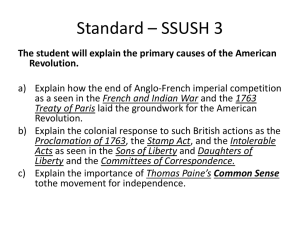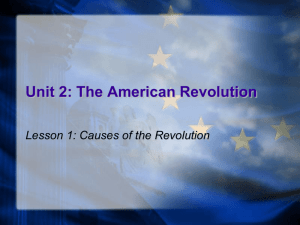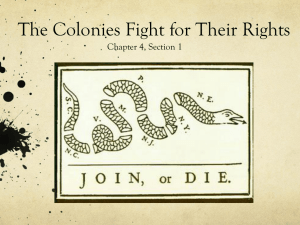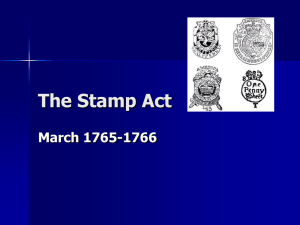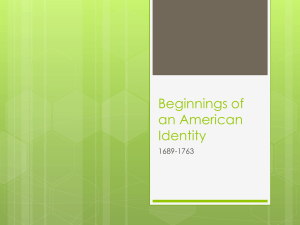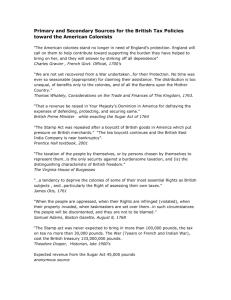French and Indian War - Worth County Schools
advertisement
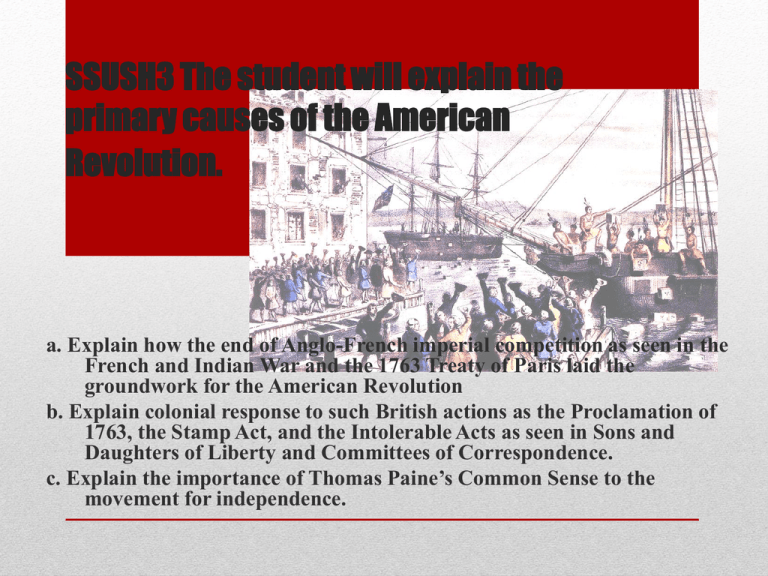
SSUSH3 The student will explain the primary causes of the American Revolution. a. Explain how the end of Anglo-French imperial competition as seen in the French and Indian War and the 1763 Treaty of Paris laid the groundwork for the American Revolution b. Explain colonial response to such British actions as the Proclamation of 1763, the Stamp Act, and the Intolerable Acts as seen in Sons and Daughters of Liberty and Committees of Correspondence. c. Explain the importance of Thomas Paine’s Common Sense to the movement for independence. French and Indian War A European war that spread to America in 1754: British and French began fighting over the Ohio River Valley (transportation, farming, and fur). French and Indian War • The English recruit colonial militias to help fight the French (including George Washington who was a Lt. Colonel for the British) • The British defeat the French in the early 1760s America’s first political cartoon (Ben Franklin 1754) What do you think this cartoon was supporting? Why? French and Indian War The war officially ends in 1763 with the signing of the Treaty of Paris. -The treaty all but eliminated French power in North America. -To pay for the war the British began taxing the American colonies (Stamp Act). How do you think many of the colonist felt about the British making them pay for the war? French and Indian War The British issued the Proclamation of 1763 which prohibited colonist from crossing the Appalachian Mountains to keep peace with western Indian tribes. The British did not want to have to put the resources into protecting western colonial farmers. Why would this policy upset some colonist? Colonial Response to the British actions Stamp Act (1765): a British tax on most printed material- was the first direct tax on the colonies. Sons of Liberty (1765) organized protest meetings and intimidated tax collectors -led to the formation of the Stamp Act Congress which sent a petition to King George. The Daughters of Liberty and the Sons of Liberty both organize effective boycotts of British goods: Daughters of Liberty promote wearing “homespun”. The British repeal the Stamp Act in 1766. Colonial Response to the British actions Intolerable Acts (1774): Laws intended to punish Massachusetts, where the majority of the boycotts against the British were taking place. -Shut down the port of Boston -Limited colonial voting rights -Limited the power of colonial courts -Forced the colony to house British soldiers Committees of Correspondences were formed to help communication between colonies: helped unify the colonies against the British. Thomas Paine’s Common Sense published in 1776. a persuasive pamphlet which blamed King George III and not Parliament for punishing the colonies. called for the colonies to declare independence from England. helped to persuade the Continental Congress to issue the Declaration of Independence

